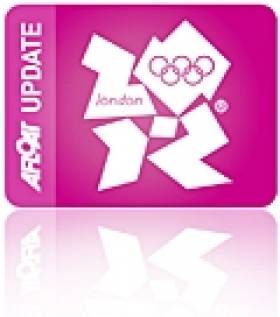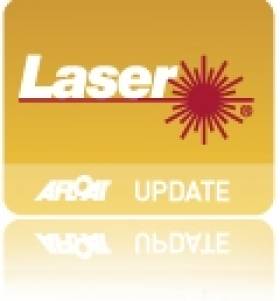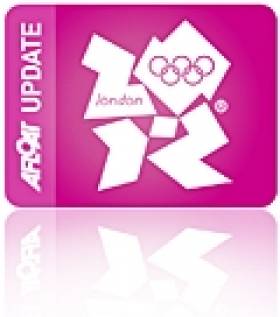Displaying items by tag: Espey
Irish Olympic Sailors Score 11,13 in Miami
#RMOCR – Ireland's Star and Laser Radial sailing teams stay in the top third of their respective fleets after the first day of racing at the 2012 Rolex Miami Olympic Classes Regatta but only just. After a mixed opening day's performance from Peter O'Leary and David Burrows the keelboat pair are 11th from 33. Annalise Murphy fares better in13th after two races from a fleet of 60 boats competing on Biscayne Bay.
The sailors are Ireland's best hopes for a sailing medal at the London Olympics and are funded by the Irish Sports Council.
Conditions on the blustery Florida race courses, often judged to be one of the best race tracks in the world, blew from the north east and 12-20 knots in strength across the five courses. Over 700 sailors are competing, drawn from over 50 countries and ten Olympic classes.
It's the second round of ISAF's Sailing World Cup Regatta and as such represents one of the most important build up regattas of the year in advance of the Olynpic Games in less than 200 days time. Both Irish crews, who qualified for London in Perth last December, are fighting hard to post consistent results but yesterday's opening two rounds, although solid performances, wil not be the post Christmas boost they were looking for.
The Irish keelboat took a yellow flag Yellow flag penalty in the first race and did well to get back to tenth O'Leary and Burrows scores of 10th and a 12th place them 11th overall.
Annalise Murphy concluded the day in 13th overall having secured a 17th and a 19th in her two races of the day.
Independent non-carded sailor James Espey got off to a consistent start in the largest of the classes, the 78 boat Laser fleet. He sits just outside the top 10 at 11th overall having finished 12th in both of his races of the day.
Also competing are the Irish Paralympic sailors John Twomey, Anthony Hegarty and Ian Costello in the Sonar class. The trio lie in the middle of the 11 boat fleet at 6th overall following a 9th and a 4th in their two races.
Predictably Olympic campaigners were to the fore at the 2011 Irish Laser National Championships yesterday but host club Lough Derg Yacht Club in Dromineer, Co. Tipperary are celebrating the first time in thirty years that a Laser sailor has won a National Championship division at their home club.
Belfast Olympic campaigner James Espey came top of the combined 151 boat fleet but yesterday the local cheers were for Derg sailor, Eoin Keller won the Irish Laser Radial National Championships.
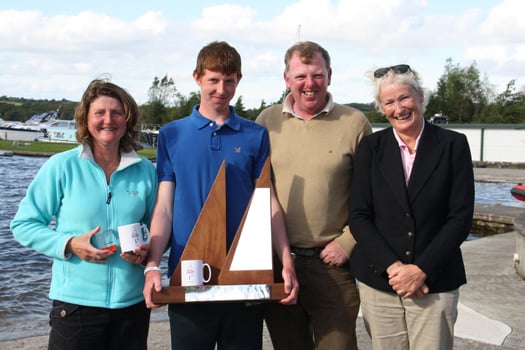
Eoin Keller with his parents Josephine and Pat, and LDYC Commodore Lucy Sanders. Photo: Geraldine Wisdom
Lough Derg Yacht Club hosted the Irish Laser National Championship from 25 to 28 August. A total of 151 sailors participated in the event. Sailors travelled from all over Ireland and the UK to race in the event. The Laser class has three rig categories according to the sail size: the 4.7 Lasers (48 boats), the Laser Radials (71 boats) and the Standard or full rigs (32 boats).
Hosting a National event for such a large fleet requires considerable organisation, both on and off the water. LDYC Sailing Secretary, Michael McCarney, said that the "seventy plus volunteers, helping out at the event, ensured four great days of racing". He said that the "wildly varying weather conditions provided quite a challenge for sailors and race management". He added that "events such as this help to promote tourism and the local economy of this scenic area".
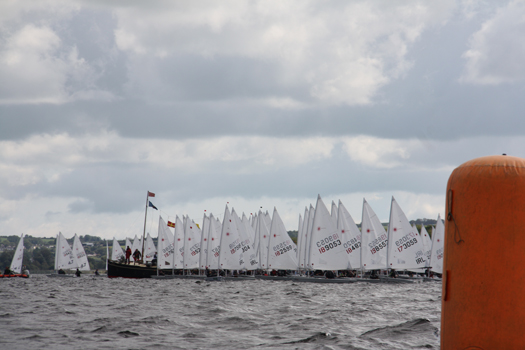
Laser Racing starts on Lough Derg
The Principal Race Officer for the event was John Lefroy. He conducted the races from his boat the 'Phoenix', and managed to get ten races in very changeable weather conditions. Liam Moloney and his team managed the finishing line on his yacht, 'Synergy'. John Lefroy said that he was "very impressed with the mark laying and rescue", and added that "the sailors were well tired at the end of the four days as I set demanding courses. Competitors at this level want to be stretched at these events". Jack Bayly and Teresa Hassey collated and posted the race results promptly every day.
Club Manager Claire Toohey coordinated Safety and Rescue for the Championship. This is a vital task, and Claire's organisational skills were very much in evidence. Claire commented that her brief was made easier by "top notch, well-trained local rescue crew, who did a superb job in quite testing conditions".
Summing up at the prize-giving, LDYC Commodore Lucy Sanders said, "I was impressed by the number of members who gave of their time to help out, particularly the younger members, who are the future of this Club". She went on to praise the work of the shore crew, including P. Keller and his helpers who efficiently managed the launch and recovery of boats, and Anne Atkinson and her team, who ensured the visitors were looked after with the hospitality for which the Club is well known.
RESULTS Irish Laser National Championship 2011Laser 4.7
1st Seafra Guilfoyle - Royal Cork Yacht Club
2nd Cian Byrne - Royal Cork Yacht Club
3rd Eoin Curran – East Down Yacht
Laser Radial
1st Eoin Keller – Lough Derg Yacht Club
2nd Robbie Gilmore – Strangford Lough Yacht Club
3rd Finn Lynch – National Yacht Club
Standard Laser Sailors
1st James Espey – Royal Ulster Yacht Club
2nd Ryan Seaton – Carrickfergus Sailing Club
3rd Matthew O'Dowd – Royal St. George Yacht Club
Ireland is on the entry list in six classes for the Weymouth and Portland International Sailing Regatta 2011, the London 2012 Olympic Test Event, that has been finalised today.
Ireland's leading hopes for a top result is in the Radial class where Annalise Murphy took bronze at the Sail for Gold regatta at the same venue. There's also high chances in the Star class with Peter O'Leary and David Burrows. Also sailing for Ireland is James Espey is in the Laser, Ross Hamilton in the Finn, Ger Owens and Scott Flannigan in the 470, Ryan Seaton and Matt McGovern in the 49er. A full entry list is available for download at the end of this post.
Sixty six nations have submitted the names of the 460 sailors who will test the conditions at Weymouth and Portland one year ahead of the London 2012 Olympic Sailing Competition.
For many of Member National Authorities there has been a selection headache with nations following game time rules where only one athlete per event is allowed.
In the Finn class Great Britain's Ben Ainslie was selected ahead of Giles Scott and Ed Wright, Spain's Marina Alabau received the nod ahead of Blanca Manchon and Anna Tunnicliffe (USA) lost out to Sally Barkow (USA).
The Women's Match Racers open the Weymouth and Portland International Regatta on 2 August 2011 with the start of their Round Robins. The Men's and Women's RS:X begin on 4 August followed by the Laser, Laser Radial and Men's and Women's 470 on 5 August before the Finn, 49er and Star sailors begin their competition on 6 August.
The London 2012 Olympic Games Sailing Competition will take place at the Weymouth and Portland Sailing Academy and Portland Marina, located in Dorset on the South Coast of England. Racing is scheduled to take place from 29 July to 11 August.At the 2012 Games sailing will introduce women's match racing for the first time. The racing format will be a single round-robin, quarter finals, semi-finals and then the finals. The nine fleet racing events will all sail an opening series before the top ten in each event contest a double-points Medal Race to decide the final positions. The Medal Races have a target time of approximately 30 minutes and will take place close to the shore at the Nothe to allow spectators ashore to get close up to the action.


























